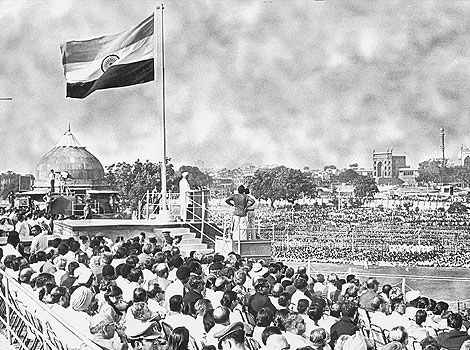August 15, 1947 was a historical day in the eventful history of India. India got independence after a long and heroic struggle against the British colonial masters. India's independence was also a milestone in the on-going anti-imperialist liberation struggles world-over.
In India, all those who dreamt of an independent India and survived to see it happen, were jubilant and despite the gloom of communal violence, celebrated this day with great passion. However, there was one organization —the RSS and its foot-soldiers— who were not celebrating the birth of a democratic-secular India, but mourning its birth.
Denigration of the Tricolour on the Eve of Independence:
RSS was ruthless in condemning the national tricoloured flag which symbolised the united heroic freedom struggle for an inclusive India. On the eve of independence, the RSS mouth-piece, Organizer, in its issue dated August 14, 1947, rejected this choice in the following harsh words:
"The people who have come to power by the kick of fate may give in our hands, the tricolour, but it will never be respected and owned by Hindus. The word three is in itself an evil, and a flag having three colours will certainly produce a very bad psychological effect and is injurious to a country."
RSS Rejected Democratic-Secular India on the Eve of Independence:
The RSS organ Organizer in the same issue (14 August,1947), rejected the whole concept of a composite nation in an editorial titled 'Whither':
"Let us no longer allow ourselves to be influenced by false notions of nationhood. Much of the mental confusion and the present and future troubles can be removed by the ready recognition of the simple fact that in Hindusthan, only the Hindus form the nation and the national structure must be built on that safe and solid foundation, the nation itself must be built up of Hindus, on Hindu traditions, culture, ideas and aspirations…"
Muslims, Christians, Sikhs, Buddhists, Jains, Parsis and Indians following other religions were ousted from the Indian nationhood thus.
RSS Rejected the Democratic- Secular Constitution of India:
On November 26, 1949, the Constituent Assembly of India (CA) adopted a model democratic-secular Constitution for India which was lauded both nationally and internationally. However, there was one significant exception. The Hindutva camp led by RSS, which had consciously denigrated the anti-British freedom struggle, mourned this historic achievement as well. Three days after the CA passed the Constitution, in an editorial on November 30, 1949, Organizer, rejected it and demanded the archaic, anti-egalitarian ‘Manusmriti’, as the constitution. It read:
"But in our Constitution, there is no mention of the unique constitutional development in ancient Bharat. Manu's Laws were written long before Lycurgus of Sparta, or Solon of Persia. To this day, his laws, as enunciated in the ‘Manusmriti’, excite the admiration of the world, and elicit spontaneous obedience and conformity. But to our constitutional pundits that means nothing."
It is to be noted that Manusmriti decrees a sub-human status to Shudras and women.
The tragedy of the present democratic-secular polity of India is that an organisation which openly declared its hatred for the former is ruling India and presenting the gravest threat to India from within.





